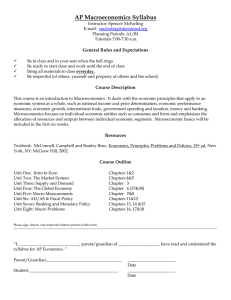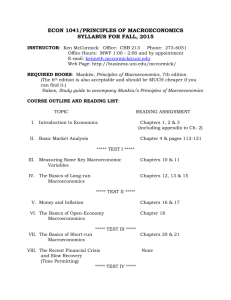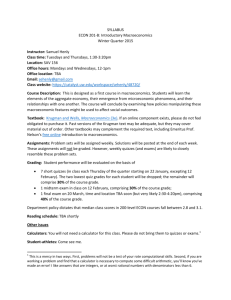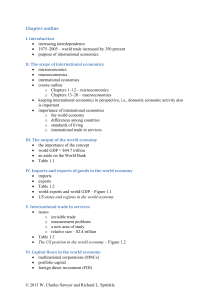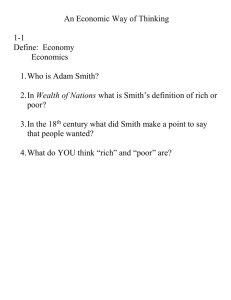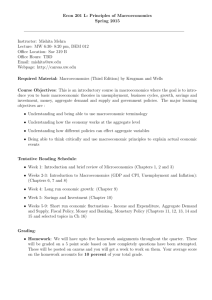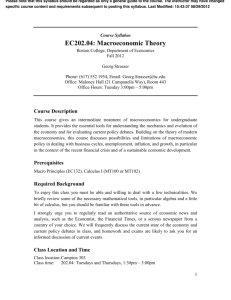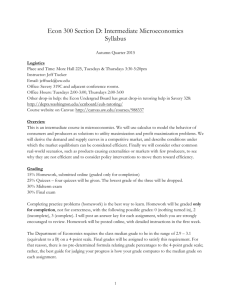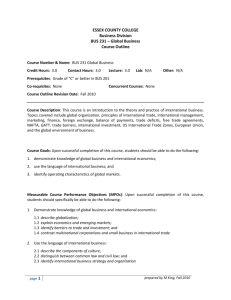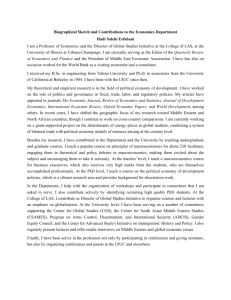Intermediate Macroeconomic Theory
advertisement
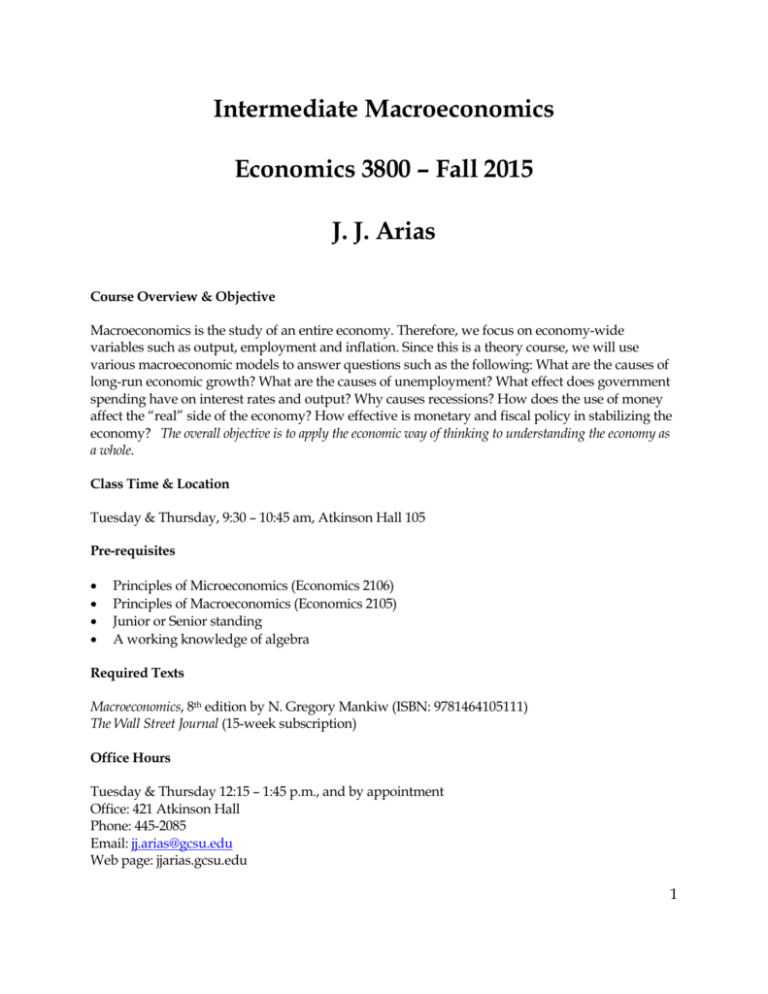
Intermediate Macroeconomics Economics 3800 – Fall 2015 J. J. Arias Course Overview & Objective Macroeconomics is the study of an entire economy. Therefore, we focus on economy-wide variables such as output, employment and inflation. Since this is a theory course, we will use various macroeconomic models to answer questions such as the following: What are the causes of long-run economic growth? What are the causes of unemployment? What effect does government spending have on interest rates and output? Why causes recessions? How does the use of money affect the “real” side of the economy? How effective is monetary and fiscal policy in stabilizing the economy? The overall objective is to apply the economic way of thinking to understanding the economy as a whole. Class Time & Location Tuesday & Thursday, 9:30 – 10:45 am, Atkinson Hall 105 Pre-requisites Principles of Microeconomics (Economics 2106) Principles of Macroeconomics (Economics 2105) Junior or Senior standing A working knowledge of algebra Required Texts Macroeconomics, 8th edition by N. Gregory Mankiw (ISBN: 9781464105111) The Wall Street Journal (15-week subscription) Office Hours Tuesday & Thursday 12:15 – 1:45 p.m., and by appointment Office: 421 Atkinson Hall Phone: 445-2085 Email: jj.arias@gcsu.edu Web page: jjarias.gcsu.edu 1 Course Grade Grades are based on a series of Wall Street Journal quizzes worth 20%, two exams each worth 25% and a final exam worth 30%. Problem Sets I will also provide problem sets that are closely related to the lecture material. The main purpose of the problem sets is to help you learn the material and practice working problems. You will not turn these in for grading. I recommend you seriously attempt to do the problem sets, and that you work in groups. I will go over at least some of the problems in class before exam day. Wall Street Journal Quizzes You can subscribe for 15 weeks at WSJ.com/studentoffer. I will assign weekly online quizzes on selected articles. Cell Phone Policy Please turn off or silence cell phones before class and do not text-message during class. I will stop lecture and give one warning when I see someone texting. After one warning, you will need to leave the classroom or give me your phone for the remainder of the class. Common Class Policies The other standard class policies are available at the following links: http://economics.gcsu.edu/general%20syllabus%20statements.htm; http://www.gcsu.edu/registrar/syllabus.htm Academic Dishonesty Students are expected to know and abide by the university honor code, available at http://www.gcsu.edu/studentlife/handbook/code.htm. The minimum penalty for academic dishonesty is a zero on the assignment or exam, which usually results in an F in the course. Advice Attend class, listen carefully, ask questions and take good notes. Review and annotate, rewrite or outline your notes soon after class. Do your best on the problem sets, and work in groups. 2 Reading List There will be lecture material that is not in the textbook. The lectures will emphasize modern macroeconomics (i.e. micro foundations) more than the text does. However, since the theories of John Maynard Keynes have contributed to the development of macroeconomics—and because they remain influential among journalists, politicians, some intellectuals and many pseudointellectuals—we will spend some time on the Keynesian perspective. In addition to the textbook chapters below, I will assign supplemental readings throughout the semester. Topic I. Introduction & Data II. Quasi—Classical Model III. Labor Market IV. Money & Inflation V. Consumption & Savings VI. Investment VII. Growth VIII. Business Cycles IX. Unemployment X. Policy and Expectations Reading Chapters 1 and 2 Chapters 3 Labor Market Equilibrium, Uncertainty and the Slow Labor Market Recovery Chapters 5 Chapter 16 and 19, Ricardian Equivalence without Graphs Chapter 17 Chapters 8 & 9, Economic Growth Chapters 10, 11 and 12 Chapter 7 Chapter 14 Tentative Exam Dates Exam I – Thursday, September 17 Exam II – Thursday, October 29 Final Exam – Thursday, December 10, 8:00 – 10:15 a.m. Exam Policies If you are a student that requires special arrangements for exams due to a disability, please come and see me before the first exam. I do not give grades via phone or e-mail. I usually return and go over exams during the next class period. You will need a small, blue book for each exam. I will redistribute blue books before the exam. Do not write your name on the blue book until I finish exchanging them. 3
